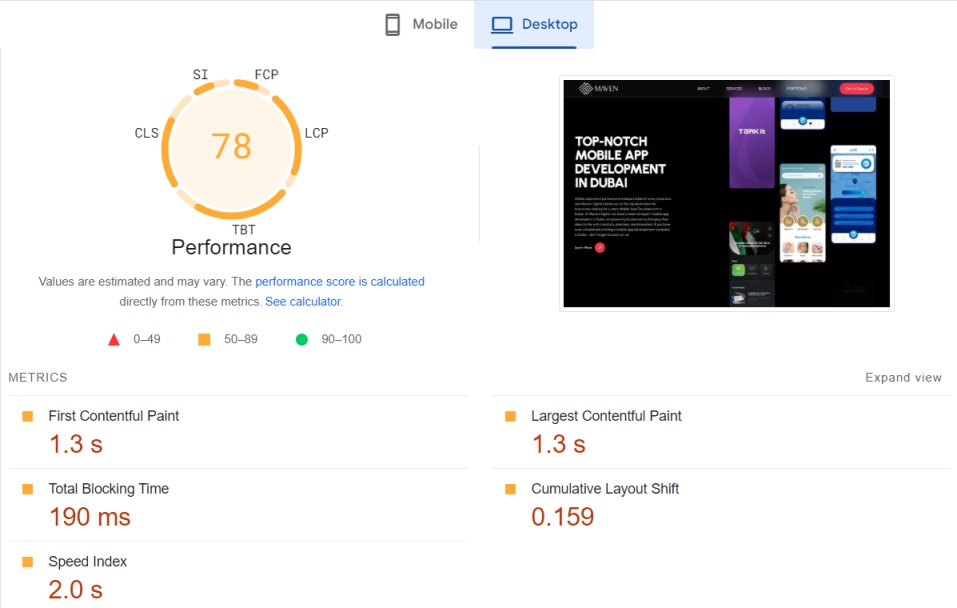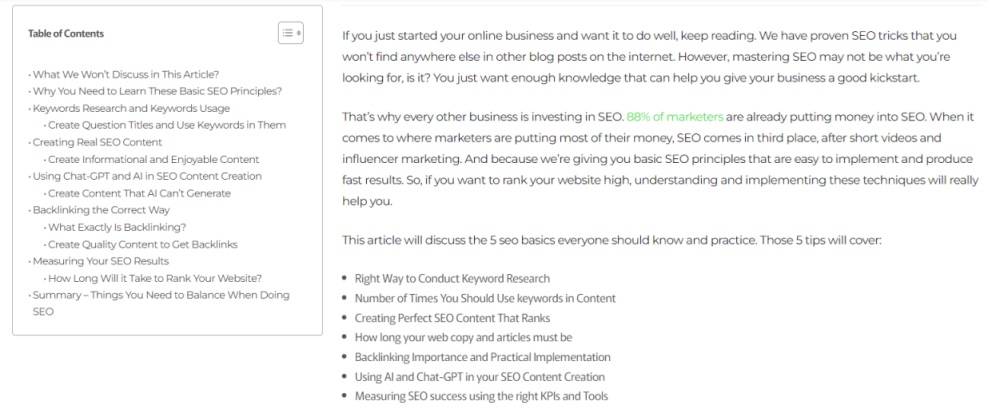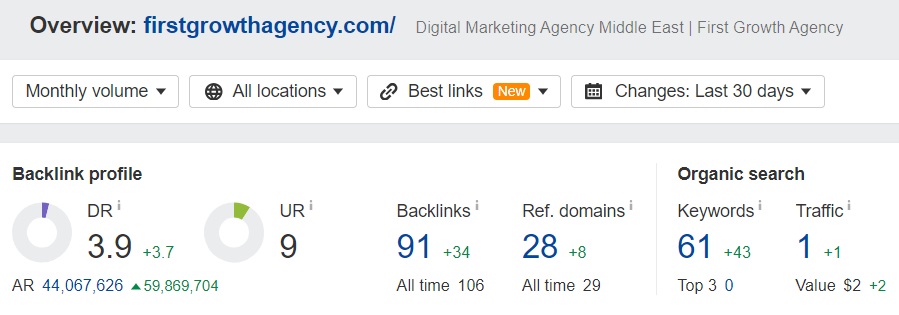SEO makes your website visible to your target audience. Your target audience includes people who bring you leads and conversions. So, SEO is all about getting organic traffic on Search Engine Results Pages (SERPs). It’s about getting your website to show up higher in search engine listings without paying for placement like you do in PPC.
Search Engine Optimization is a whole word in itself. It’s not an A-Z method that you implement and your website pops on the top of Google SERPs (search engine results pages). And you definitely don’t need to learn how to master SEO. There are some basics of SEO that, if done correctly, can help your website secure the top position. This SEO basics tutorial will tell you about those optimization basics.
Heads Up: For Non-Technical Basic SEO Principles, click here.
Basic SEO 1: Finding Keywords

Understand what your customers are looking for when they search
Keywords tell you what people look for, how much, and how they want it. Knowing your audience and what they want is key to making your website show up in searches. People only see individual pages when they search, not your entire website. So, spread your keywords across all your pages to get more visitors.
Keyword research helps you know your customers better and create content they’ll like. And in SEO, we choose words based on how many people search for them (search volume) and how hard they are to rank for (keyword difficulty). Even less-searched words can bring more traffic if they’re specific. So, target those keywords.
Google shows different things based on what people search for – info, places, buying stuff, etc. Watching keyword intent helps your content fit what people want. Sometimes, Google offers more options if a search isn’t clear. Understand these Google SEO basics and use the right keywords in your content to give people what they search for.
Basic SEO 2 Technical SEO

Make Your Site Eligible to Apply SEO Rules On
You want your website to load fast and look good on all devices for the perfect SEO. When your site loads fast, more people will stick around and check it out. Study shows that more people use smartphones to browse the internet. So make sure your site works perfectly on small screens.
You also want to keep your website secure using HTTPS. Besides that, picking a good domain name and using reliable platforms like WordPress matters too.
Finally, use the right SEO keywords in your titles and URLs, as they help people find your site more easily on search engines. And make sure to structure your website in a logical way. It should make sense for people and search engines.
Basic SEO 3: Content Creation

Create Better Content Than All the Top-Ranked Sites
If your content is helpful and what folks are looking for, it can boost where you show up in search results. Search analyzes what people want and how they look for info. It’s called content centric SEO. Google’s SGE and AI have changed how SEO works.
You need expertly written content to get people interested, and have a brand that they trust. It’s because there is more content made by AI and you want to make sure what you offer is not the same as everyone else offers. You want to make sure your content is real and helpful.
The bottomline is that people must have a good time when they visit your site. And to connect with customers, you want to speak their language. Checking out what people say on Reddit and Amazon can help businesses understand what people like. It makes content creation easier since you already know what they want and how they want it. You can tweak your content accordingly.
Basic SEO 4: Keywords Placement

Place Keywords in Title, Metadata and Content
All the high-ranking websites have got the right keywords and phrases, and they use them in their content wisely. Basically you want to put keywords in titles, descriptions, headings and URL. When you describe your page, use your words there too.
Your page title should have one important word, but not be too long. The main title on your page, called the H1 text, should also include your important word. And when you write, use your words naturally. Don’t overuse them, or it looks bad.
Words matter a lot for search engines. Check which words your website already ranks for. Decide which words are best for each page. Each page should focus on one to four words. Tools like STAT and Ahrefs can help you track your words.
Basic SEO 5: Internal and External Linking

Boost Inherent link juice and support facts
When you link to more content on your website, it helps people learn step by step. It makes your site easier to understand for people. Search engines also like it because they can follow the links to learn more about what your site is all about.
This helps them organize their search results better. So, by linking to related content, you’re making things better for your readers and for search engines too.
And when other websites link to your site, it shows search engines that your site has useful, reliable information about certain subjects. So, if people are linking to you, it means you know what you’re talking about.
Basic SEO 6: Backlinking

Get Links from Industry Leaders Websites to Elevate Rankings
Back then, Yahoo! and Alta Vista were the top search engines, deciding which websites were good based on their content. Then Google came in with its PageRank Algorithm, which looked at how many links pointed to a page. “Since then, backlinking has become one of the optimization basics, determining if a webpage is good enough.
But Google has changed things up over time. Now, it cares more about the quality of links than just how many there are. They made updates like Google Penguin to make sure links are top-notch. Where the link comes from matters a lot. If it’s from a really reliable source, or high DA (domain authority) websites, it means more than if it’s from some random blogger.
Also, the link needs to match with what it’s linking to. If it’s related, it’s better. And where the link is on the page matters too. If it’s in the main content, it’s worth more than if it’s hidden in a footer or sidebar. Google likes links that are put there on purpose, not just randomly.
Basic SEO 7: Monitoring Results

Track Website Rank and Google PageRank for SEO Success
Be patient and give search engines some time, like a few weeks before they could show you your analytics. Then check where your website ranks and see how often it’s moving up or down in the SERPs.
You can make use of tools like Google Search Console, Google Analytics, Adobe Analytics, Bing Webmaster Tools to monitor your SEO results. There are also other tools as well, like Ahrefs, Semrush, and MOZ that help you track keywords and positions.
You also want to keep track of changes in search engines, keyword rankings, traffic changes, updates to your site, and sales. Tracking all this data is essential as it gives you ideas for growing your site. If you want more detailed tracking, think about getting a premium SEO tool. It helps you keep an eye on important keywords and helps you plan ways to do better.
Conclusion
The reason behind website’s not ranking high is people’s failure to understand the basics of SEO. Keywords placement and technical SEO can get you nowhere if you don’t understand the science of Google SEO basics that ranks your content high. As we said above, SEO changes too often, so these essentials might change in the future. But in the present day, these are the fundamentals of what search engines want to make your content appear high on SERPs:
- Helpful Content Creation
- Making Website Indexable
- Choosing the right keywords
- Properly placing those keywords
SEO isn’t the same for everyone, but these simple ideas are key to boosting your website’s rank on search engines and getting more people to visit naturally. As the internet changes, keeping up with SEO trends and improving your strategies will help you stay ahead and keep your website visible and interesting to people online. At First Growth Agency, we help you with SEO and make it easy for you to get noticed online and grow your presence.











